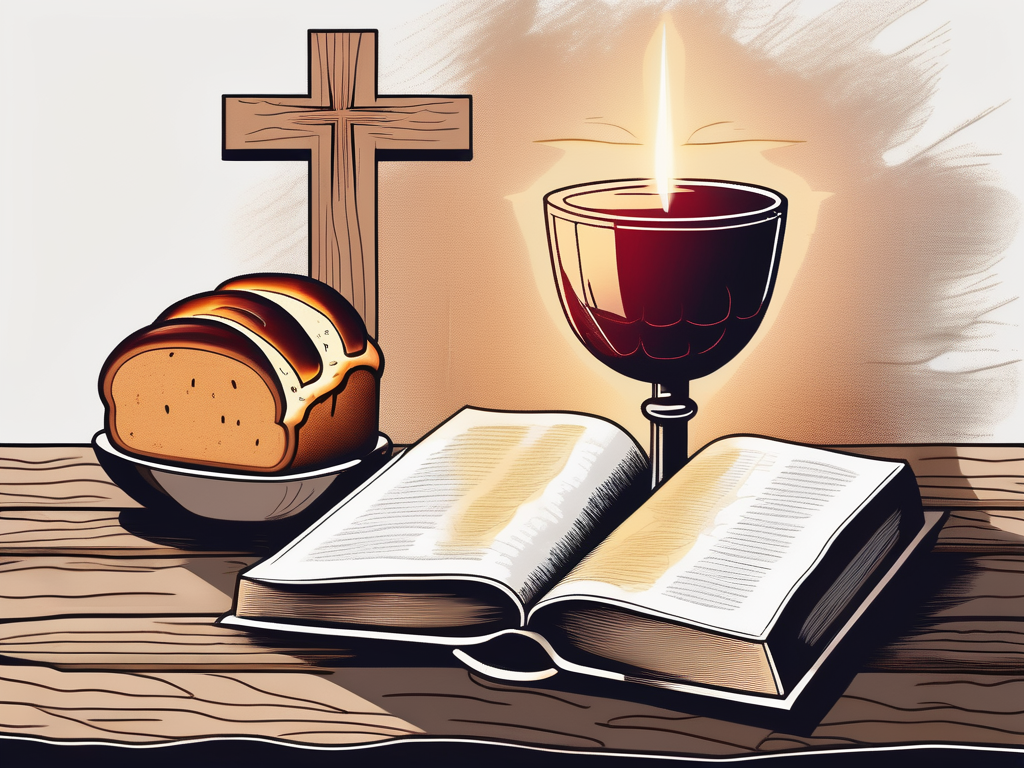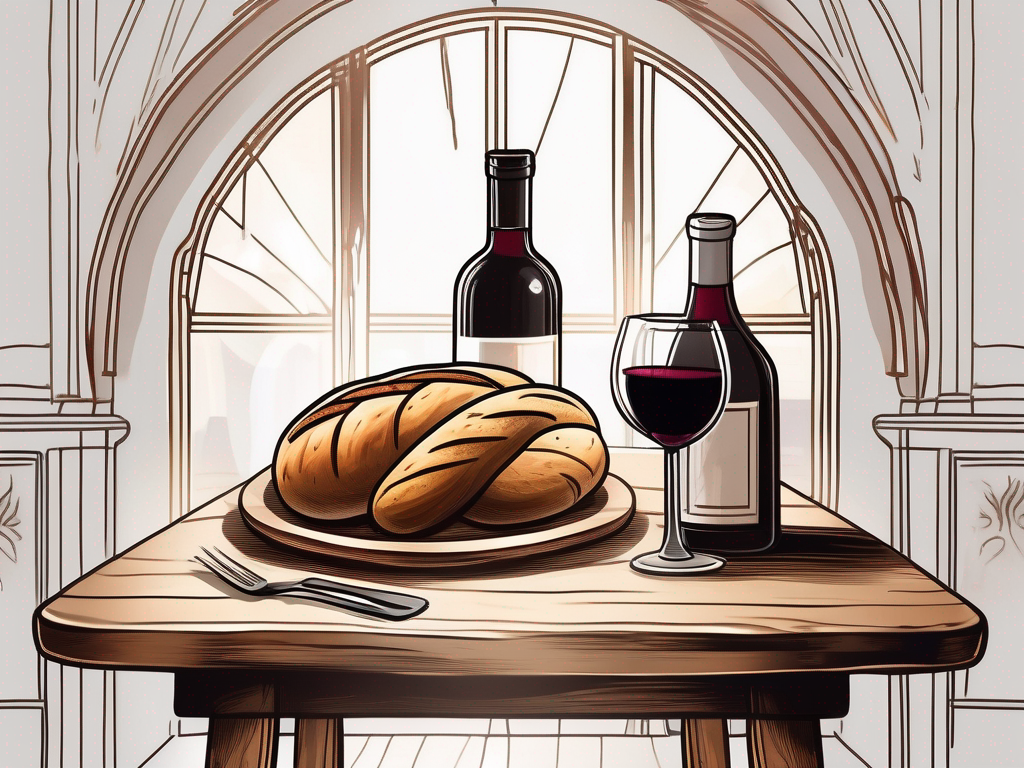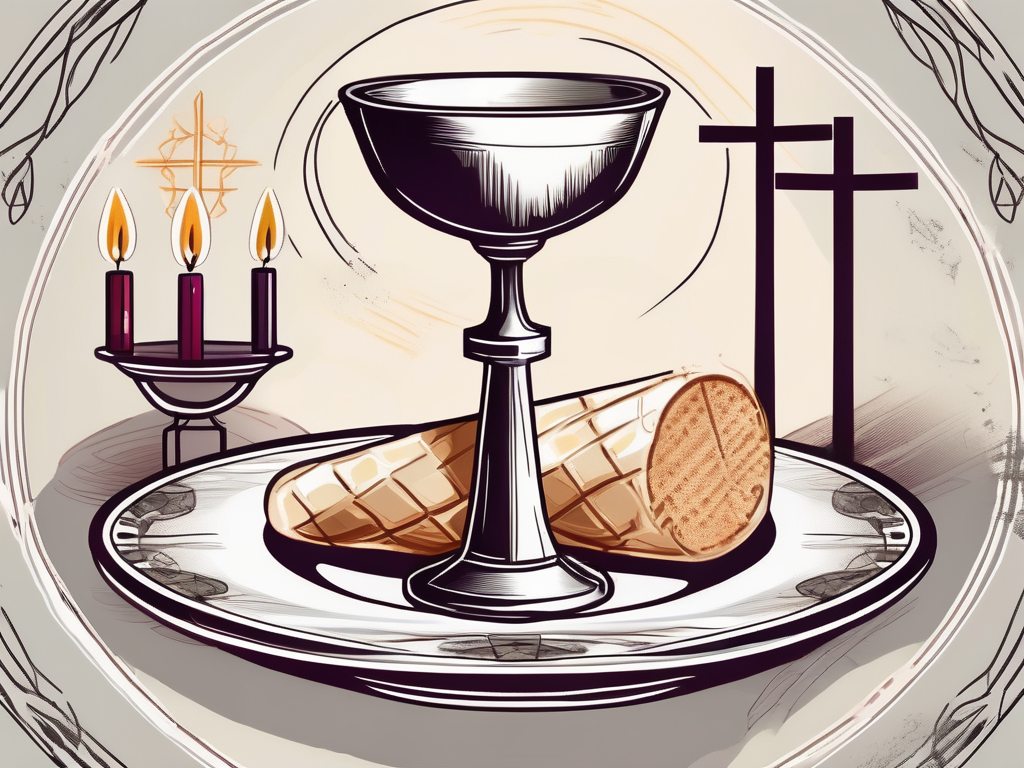Understanding the Concept of Communion
Communion is a sacred practice that holds great significance in Christianity. It is a symbolic act that commemorates the death and resurrection of Jesus Christ. Communion, also known as the Lord’s Supper or the Eucharist, is a time of reflection and remembrance for Christians all around the world.
Communion is rooted in the biblical understanding of the Last Supper, where Jesus shared bread and wine with His disciples. The practice of communion is a way for believers to partake in the body and blood of Christ, symbolizing their union with Him and the covenant He established through His sacrifice on the cross.
Biblical Definition of Communion
In the Bible, communion is described as a communal act of worship and remembrance. The Apostle Paul writes in 1 Corinthians 11:23-26:
For I received from the Lord what I also passed on to you: The Lord Jesus, on the night he was betrayed, took bread, and when he had given thanks, he broke it and said, “This is my body, which is for you; do this in remembrance of me.” In the same way, after supper, he took the cup, saying, “This cup is the new covenant in my blood; do this, whenever you drink it, in remembrance of me.” For whenever you eat this bread and drink this cup, you proclaim the Lord’s death until he comes.
This passage underscores the importance of communion as an act of remembering Jesus’ sacrifice and proclaiming His death until His return. It is a time of deep reflection on the love and grace of God.
The Significance of Communion in Christianity
Communion holds great significance in Christianity as it is a tangible representation of Christ’s sacrifice and an opportunity for believers to connect with Him spiritually. Through communion, Christians are reminded of the immense love and grace of God, who offered His Son as a sacrifice for the forgiveness of sins.
Communion also serves as a reminder of the unity among believers. It is a time when Christians come together as a community to partake in the same elements and share in the spiritual nourishment they represent. It reinforces the bond of fellowship and the common faith shared among believers.
Furthermore, communion is not only a personal act of devotion but also a communal experience. It is a moment when the entire congregation joins together in remembrance and worship. The act of taking the bread and wine symbolizes the believers’ participation in the body and blood of Christ, signifying their unity with Him and with one another.
Moreover, communion is a time of self-examination and repentance. Before partaking in the elements, Christians are encouraged to examine their hearts and confess any sins or shortcomings to God. It is a moment of humility and surrender, acknowledging one’s need for God’s forgiveness and grace.
Additionally, communion serves as a reminder of the future hope that Christians have in the return of Christ. As they partake in communion, believers proclaim the Lord’s death until He comes again. It is a declaration of faith in the promise of eternal life and the anticipation of the fulfillment of God’s kingdom.
In conclusion, communion is a sacred practice that holds deep meaning for Christians. It is a time of remembrance, reflection, and unity. Through communion, believers connect with the sacrificial love of Christ, reaffirm their faith, and look forward to the future hope of His return.
Biblical References to Communion
The practice of communion has its roots in both the Old and New Testaments. Let’s explore these biblical references to gain a deeper understanding of the rich history behind communion.
Communion in the Old Testament
In the Old Testament, we find foreshadowings of communion through various instances of sacrificial meals. One notable example is the Passover feast, where the Israelites commemorated their deliverance from slavery in Egypt. During this feast, they ate unleavened bread and a sacrificial lamb, symbolizing their liberation through the shedding of blood.
These covenantal meals served as reminders of God’s faithfulness and His redemptive plan for His people. They foreshadowed the ultimate sacrifice of Jesus, who became the sacrificial Lamb of God.
Another significant example of communion in the Old Testament is the meal shared by Melchizedek and Abraham. In Genesis 14, after Abraham’s victory in battle, Melchizedek, who was both a king and a priest, brought out bread and wine and blessed Abraham. This act of sharing a meal and receiving a blessing foreshadowed the communion meal that Jesus would later institute.
Additionally, in the book of Exodus, we read about the establishment of the Tabernacle and the consecration of the priests. As part of their ordination, the priests were instructed to eat the meat of the sin offering, signifying their participation in the atonement and their identification with the sacrifice. This act of eating the sacrificial meat can be seen as a precursor to the act of partaking in communion.
Communion in the New Testament
The New Testament provides a more explicit account of communion through the Last Supper. In the Gospels of Matthew, Mark, and Luke, Jesus institutes the practice of communion during the Passover meal with His disciples.
As they were eating, Jesus took bread, blessed it, broke it, and said, “Take, eat; this is my body.” Then He took the cup, gave thanks, and said, “Drink from it, all of you. This is my blood of the covenant, which is poured out for many for the forgiveness of sins.”
These words of Jesus established the practice of communion, and it has been celebrated by believers ever since as a reminder of His sacrifice and the new covenant in His blood.
Furthermore, the apostle Paul provides additional insights into the significance of communion in his letter to the Corinthians. He emphasizes the unity of believers in partaking of the bread and the cup, stating, “Because there is one loaf, we, who are many, are one body, for we all share the one loaf” (1 Corinthians 10:17). Paul also warns against partaking in an unworthy manner, reminding believers to examine themselves before participating in communion.
Throughout the New Testament, we see the early Christian communities regularly gathering together to break bread and share in the Lord’s Supper. This act of communion served as a means of worship, fellowship, and remembrance of Christ’s sacrifice.
As we reflect on these biblical references, we gain a deeper appreciation for the significance of communion in the Christian faith. It is not merely a ritual or tradition but a sacred act that connects us to the redemptive work of Christ and unites us as the body of believers.
The Symbols of Communion
Communion is a sacred practice that holds deep meaning for believers. It is characterized by two primary symbols: the bread and the wine. These elements not only represent Jesus’ sacrifice but also serve as a reminder of the believer’s relationship with Him.
The bread used in communion symbolizes Jesus’ body that was broken for us. Just as the unleavened bread used during the Passover feast symbolized the haste in which the Israelites left Egypt, the bread used in communion represents the swiftness of Jesus’ sacrifice on the cross. It reminds us of the urgency with which Jesus willingly gave Himself up for the salvation of humanity.
Similarly, the wine used in communion represents Jesus’ blood that was shed for the forgiveness of sins. It signifies the eternal covenant between God and His people, sealed by the blood of Jesus. Through His blood, believers are cleansed and reconciled to God, experiencing the fullness of His grace and mercy.
The Last Supper
The Last Supper, where Jesus shared the bread and the wine with His disciples, holds deep significance in the practice of communion. It serves as a powerful reminder of His impending sacrifice and the depth of His love for humanity.
During this final meal together, Jesus deliberately instituted the practice of communion, instructing His disciples to continue celebrating it in remembrance of Him. The Last Supper symbolizes the ultimate act of love and redemption that Jesus would accomplish through His death on the cross. It is a poignant moment that encapsulates the selflessness and compassion of Jesus, as He willingly offered Himself as the perfect sacrifice for the sins of the world.
As the disciples gathered around the table, they shared in the bread and the wine, partaking in the symbolic representation of Jesus’ body and blood. In that moment, they were not only commemorating the past but also anticipating the future, as Jesus foretold His resurrection and the hope that it would bring.
Through the act of communion, believers are invited to enter into a deeper understanding of Jesus’ sacrifice and to reflect on the significance of His death and resurrection. It is a time of solemn remembrance and heartfelt gratitude, as believers partake in the symbols that represent the very essence of their faith.
The Purpose and Benefits of Communion
Communion serves a vital purpose in the life of a Christian. It offers numerous benefits that contribute to spiritual growth and a deepened relationship with God.
But what exactly is communion and why is it so important? Communion, also known as the Lord’s Supper or the Eucharist, is a sacred practice that involves partaking in the symbols of Jesus’ body and blood. It is a time of remembrance and worship, where believers come together to reflect on the redemptive work of Christ and express their gratitude for His sacrifice.
Through communion, believers have the opportunity to reflect on their spiritual journey and the redemptive work of Christ. It serves as a constant reminder of God’s grace and love, motivating believers to live in obedience to His Word.
But communion is more than just a reminder. It is also a time of self-examination, as the Apostle Paul advises in 1 Corinthians 11:28: “Let a person examine himself, then, and so eat of the bread and drink of the cup.” This self-reflection allows believers to identify areas of sin in their lives and seek forgiveness and restoration through Christ.
Communion is an act of worship and surrender to God. By partaking in the symbols of His body and blood, believers express their gratitude for the sacrifice of Jesus and declare their allegiance to Him.
It is a time to honor and glorify God, acknowledging His holiness and His perfect plan of redemption. Through communion, believers proclaim their faith in Jesus’ death and resurrection and are reminded of their identity as children of God.
But communion is not just an individual act of worship. It is also a communal experience, where believers come together as the body of Christ. It is a time of unity and fellowship, where believers can encourage and support one another in their faith.
Furthermore, communion is a tangible expression of the unity of the Church. As believers partake in the same symbols, they are reminded that they are part of a larger family of believers, bound together by their shared faith in Jesus Christ.
Communion also serves as a means of grace. It is a time where believers can experience the presence of God in a special way. As they partake in the bread and the cup, they can sense the spiritual nourishment and renewal that comes from being in communion with God.
Ultimately, the purpose and benefits of communion are multifaceted. It is a time of remembrance, self-examination, worship, unity, and grace. It is a practice that deepens our relationship with God and strengthens our faith. So let us approach communion with reverence and gratitude, knowing that it is a sacred and transformative experience.
Different Christian Perspectives on Communion
While communion holds a central place in Christianity, different Christian traditions may vary in their understanding and practice of this sacred act. Let’s briefly explore the perspectives of the Catholic and Protestant traditions regarding communion.
Catholic View on Communion
In the Catholic tradition, communion is considered one of the sacraments and is believed to be the actual body and blood of Christ. This belief, known as transubstantiation, holds that the bread and wine undergo a miraculous transformation into the physical presence of Jesus.
Catholics approach communion with reverence and see it as a powerful means of receiving grace and experiencing unity with Christ. The focus is on the real presence of Jesus, and partaking in communion is seen as an act of worship and spiritual nourishment.
Protestant View on Communion
Protestant denominations approach communion in various ways, but most understand it as a symbolic representation of Jesus’ sacrifice. The bread and wine are seen as elements that represent His body and blood, rather than a physical transformation.
The emphasis in Protestant traditions is often on the spiritual significance of communion, as a time of remembrance and spiritual communion with Christ. It is a time for believers to reflect on the grace and salvation offered through Jesus’ sacrifice.
While there may be theological differences in how communion is understood and practiced, the central focus in both Catholic and Protestant traditions remains on the redemptive work of Jesus and the spiritual nourishment found in communion with Him.












